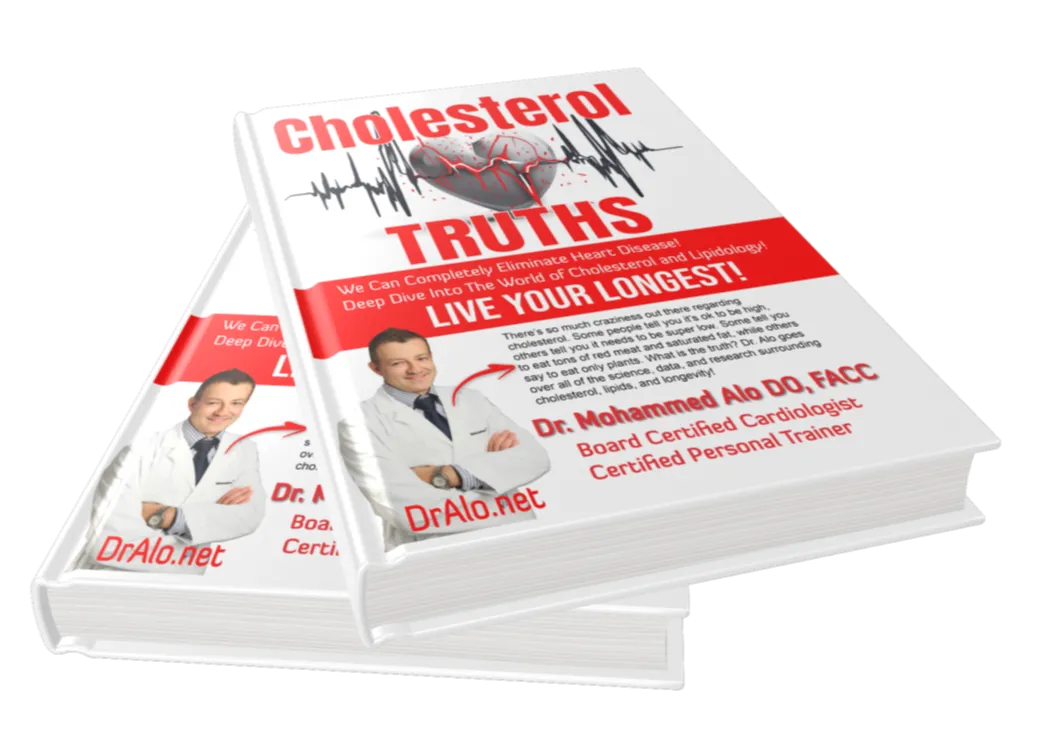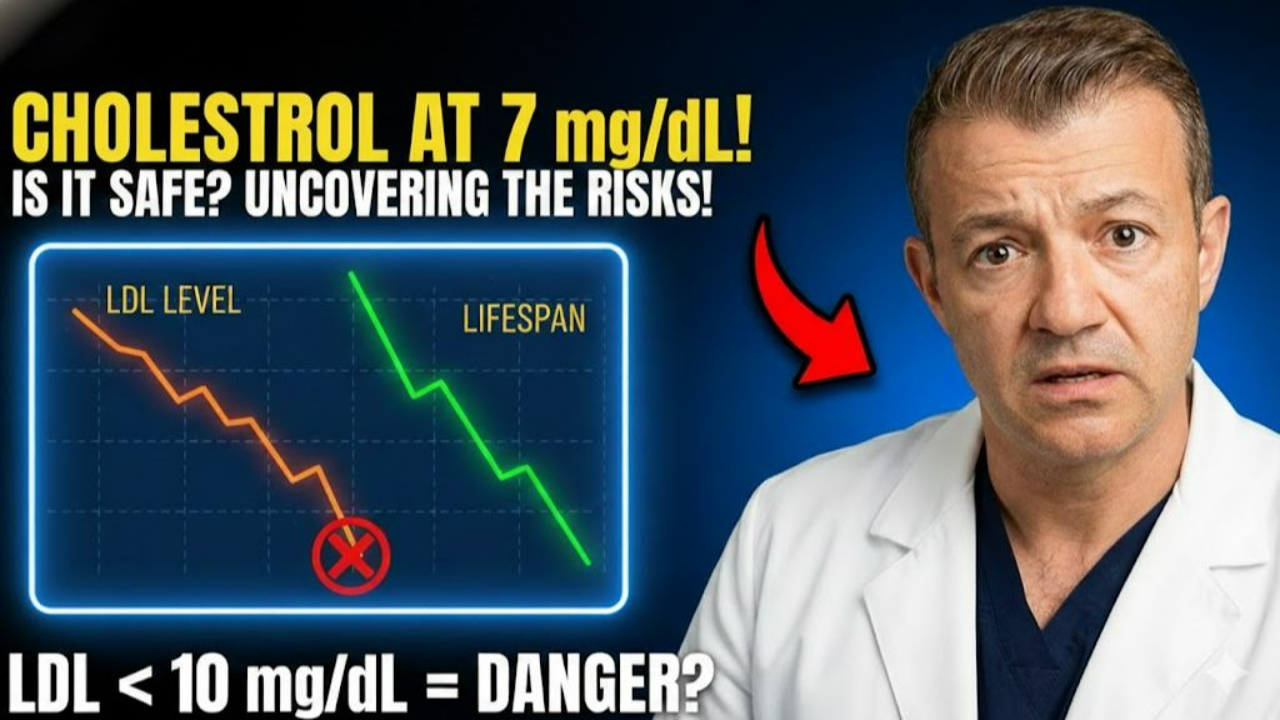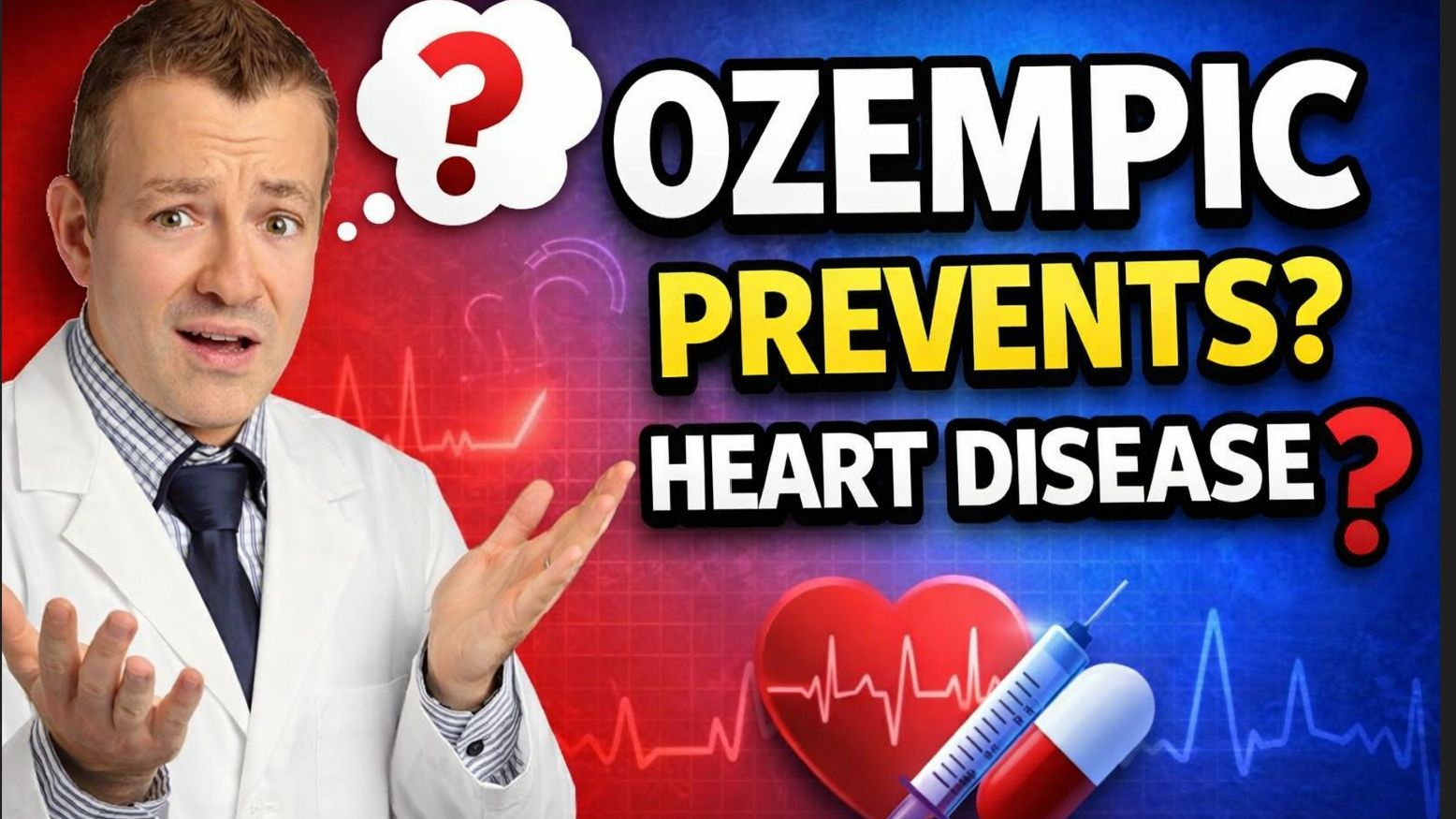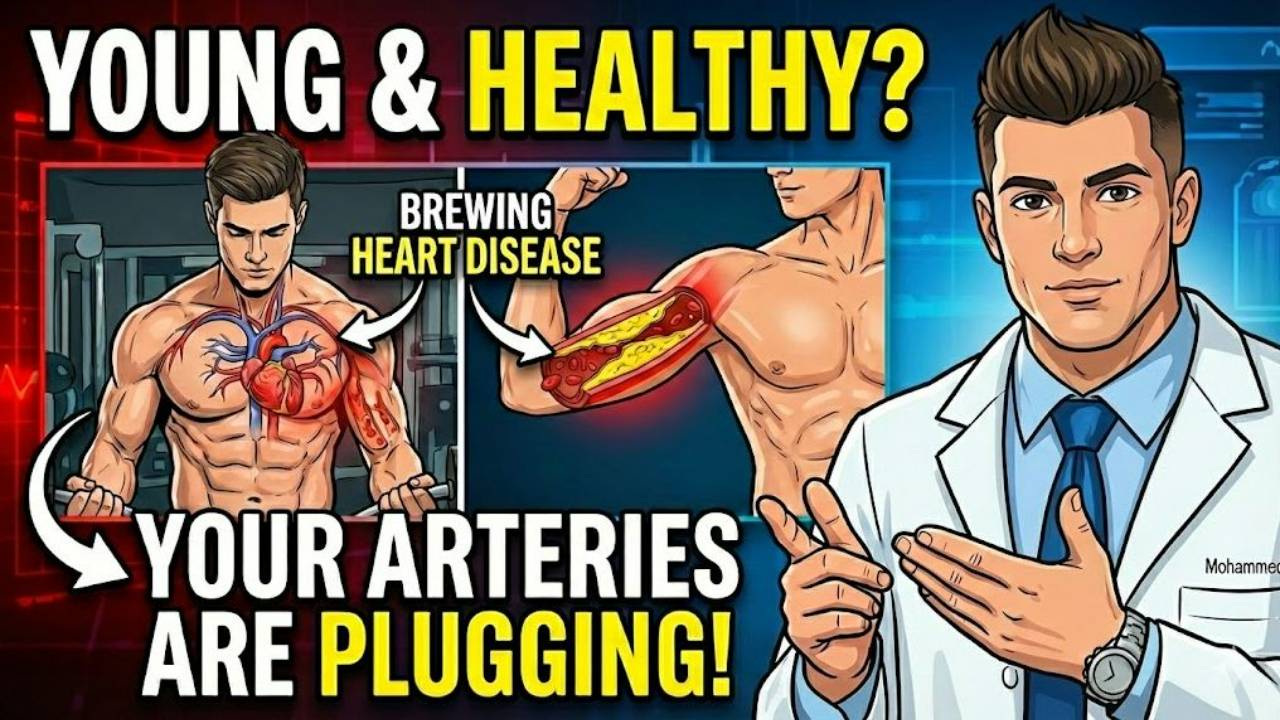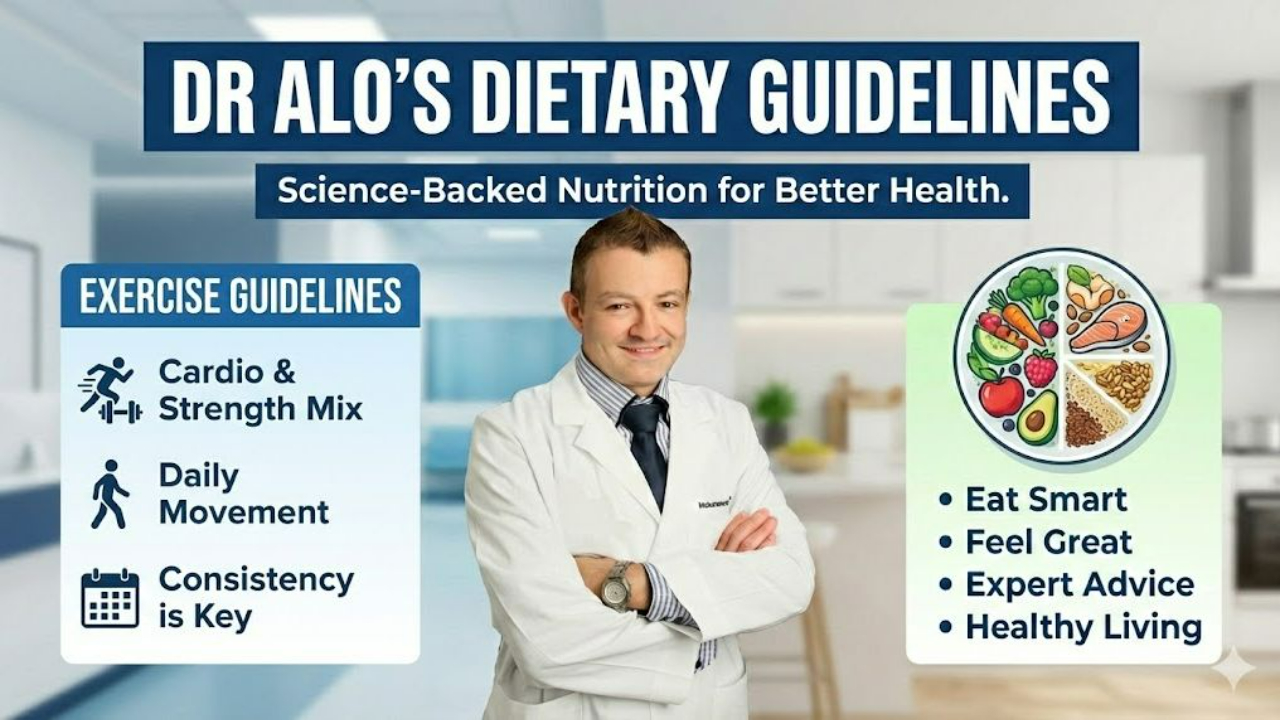Red Meat Healthy? Latest Science and Research
Nov 18, 2022
Is Red Meat Bad For You?
With the popularity of the Carnivore Diet, many of my patients and attendees at medical conferences have questions regarding red meat and it's health benefits. Previously, we have seen similar fad diets like the Atkin's Diet in the late 1980s and early 1990s, and more recently the Keto Diet.
Historically, red meat has always increased total cholesterol and LDL cholesterol (bad cholesterol) due to the excessive amounts of saturated fat in red meat.
Grab my Actual Weight Loss Book if you want more evidence based healthy living strategies without fads, gimmicks, and food restrictions
Red meat, which includes beef, pork, goat, bison, venison, and lamb, has long been a staple of many diets around the world. Research suggests that consuming red meat may be harmful to cardiovascular health.
There are absolutely no studies that show that consuming red meat reduces total cholesterol or LDL cholesterol. Not one.
Is Red Meat Good For Your Heart?
The most common question I get is regarding red meat intake. How can something so natural, so nutrient dense, actually contribute to cancer, diabetes, and heart disease. Does it matter if it is grain fed or grass-fed?
First of all, I eat red meat. It is not every day though. But I do enjoy a nice ribeye or burger, rarely. I am a food snob and I make them myself. I have a 10 year-old boy that loves cooking and loves a good steak. There are obviously leaner cuts of red meat. People like to just label me “vegan” and then discount everything I have to say.
I try to be as objective and as scientific as possible when it comes to data. I am not here to prove a point one way or the other. You can decide for yourself after reading this how much red meat you want to eat.
If your current diet includes red meat, and you enjoy it, and it keeps you sane and on track for your weight loss (or gain) goals or strategy, that’s ok. Just let us treat down your apoB if it goes up. There are obviously other issues with red meat intake that will not be improved by treating apoB, namely inflammation, diabetes, and cancer risks.
To date, there is not a single study that shows that red meat intake lowers cholesterol. Let’s be clear on that.
But what does the data say?
In one of the largest reviews of red meat intake they found that:
• Each 50 g/day higher intake of processed meat (like bacon, ham, and sausage) increased the risk of coronary heart disease by 18%.
• Each 50 g/day higher intake of unprocessed red meat (like beef, lamb, and pork) increased the risk of coronary heart disease by 9%.
• There was no clear link between eating poultry (like chicken and turkey) and an increased risk of coronary heart disease.
They believe that the reason for this was due to higher salt in the processed meat category and higher saturated fat in red meat in general.
This was the most comprehensive meta-analysis on this topic to date. It was published in 2023. It’s very current. It included 13 studies and 32,630 individuals. It was very well done.
Here is the plot of relative risk reduction from the study:

For unprocessed meats, you can see that the studies with the largest number of participants showed the largest increases in relative risk.
For processed meat, below, the results were even more obvious showing mostly increased risk of ischemic heart disease.

For poultry, the results seemed mostly equivocal and may even reduce mortality slightly. See below:

You can read the study:
https://www.tandfonline.com/doi/full/10.1080/10408398.2021.1949575
Red Meat Intake Increases Inflammation
It’s also important to note that studies have shown that increased red meat intake usually increases inflammation and diabetes as discussed in previous chapters.
Increased red meat intake is associated with higher levels of inflammation. There are studies on red meat intake that have shown that obesity matters. If you are obese, then you have more inflammation and saturated fat intake will matter more. We know that obesity increases inflammation. The best way to reduce inflammation is to reduce obesity.
We also know that the more risk factors you stack, the worse. If you are obese and you smoke, and you drink, and you have high apoB, and you are inactive, this portends higher risk than only 1 or 2 of these. If you have a higher risk to begin with, then yes, eating more red meat will be worse.
Red meat intake has been associated with increased inflammation and cancer progression as well.
Read the studies:
https://pubmed.ncbi.nlm.nih.gov/28628401/
https://pubmed.ncbi.nlm.nih.gov/25548184/
Red Meat Intake Increases All Cause Mortality
Another very large study found that increasing red meat intake is associated with increased all-cause mortality, cardiovascular mortality, and cancer. It was a meta-analysis of 9 studies and 17 cohorts with 150,328 participants.

Look at the plot above. This is the plot for (a) all-cause mortality (top), (b) cardiovascular mortality (middle panel), and (c) cancer mortality (bottom) associated with each serving per day of processed meat. You’ll notice that most of the studies in this meta-analysis demonstrated increased risk with increasing processed or unprocessed red meat intake.
The results for all-cause mortality seem to be the most pronounced.
The next graphic was for unprocessed red meat. See below.

You still had increased risk, but not as clear as with processed meats.
The third and final graphic was for each serving of total meat per day. See blow:

You have a remarkably similar pattern. Regardless of whether the meat was processed or unprocessed, you had similar results.
You can read the study:
https://pubmed.ncbi.nlm.nih.gov/26143683/
Red Meat And Diabetes?
Another very large study from October of 2023 showed that total intake of processed and unprocessed red meat increased the risk of type 2 diabetes. They looked at 5.4 million person years of follow up and found that red meat intake was linearly and positively associated with higher intakes of red meat intake. The hazard ratio from the highest quintile to the lowest quintile was 1.62, meaning that those who ate the highest amounts of red meat versus those who ate the least, had a 62% higher risk of type 2 diabetes. If it was processed red meat, the hazard ratio was 1.44 and for unprocessed it was 1.40. This study examined food logs as well as food frequency questionnaires. This was discussed more extensively below.

The above is one of the summary graphics from that study. Whether you examined total red meat, processed, or unprocessed, the results were unequivocal. Your risk for type 2 diabetes increased.
Read the full study:
https://ajcn.nutrition.org/article/S0002-9165(23)66119-2/fulltext
Is Grass Fed versus Grain Fed Meat Better For Your Health?
Does it really matter what your cow grazed on or what it was fed?
Many argue that red meat that is grass fed is healthier because it has more omega 3 fatty acids and less saturated fat. Omega 3 fatty acids, like in salmon, are thought to be cardioprotective.
A study published in 2022 examined this claim.
Grass fed beef contained less total fat than grain fed beef. A 100 gram piece of meat from grass fed beef contained 2773 mg less total saturated fatty acids than the same amount from grain fed beef. Grass fed beef also showed a more favorable saturated fat profile containing less cholesterol-raising fatty acids (C12:0 to C16:0), but contained a lesser amount of cholesterol-lowering c18:0 than grain fed beef.
In terms of essential fatty acids, grass fed beef showed greater levels of trans-vaccenic acid and long-chain n-3 polyunsaturated fatty acids (PUFA, EPA, DPA, DHA) than grain fed beef.
Grass fed beef also had more n-3 PUFA (generally considered healthier) which reduced the ratio of n-6 to n-3 and is thought to offer better health benefits than grain fed beef.
Grain-fed beef also showed less EPA, DPA, and DHA. It’s also possible for grain-fed beef to achieve a similar dietary intake of long-chain omega-3 fatty acids.
Grain-fed beef contained higher total monounsaturated fatty acids that have beneficial roles in the reduction of CVD risks than grass-fed beef. In Hanwoo beef (Korean native cattle), grain-fed showed higher EPA and DHA than grass-fed beef. See the fish oil discussion in this book. Fish oil from fish has demonstrated a cardioprotective effect, but not so much as a supplement.
They also reported that grass fed beef had overall leaner carcasses with less overall fat, especially saturated fat. The slightly better outcomes may be due to less overall saturated fat in the same 100 gram cut of beef, where more of it is protein, and not fat.
Read the full study:
https://www.ncbi.nlm.nih.gov/pmc/articles/PMC8728510/
You can dive into the references section from the above study for even more on this topic.
So where do I stand on beef intake and the grass fed versus grain fed debate?
Grass fed beef does taste different. It tastes more gamey. If you have ever had deer (venison), goat, or lamb, you know the taste. For me personally, I don’t like it. But it’s a personal preference.
Fattier cuts of meat with more intramuscular fat usually taste better. That’s why everyone is chasing angus, wagyu, Kobe, or other varieties that have more marbling in their meat.
Like I said earlier, I love a great ribeye. I usually sous vide the steak and then finish it on a wood burning or charcoal grill if available. I also enjoy very lean cuts, like filet mignon. My 10 year old son likes leaner cuts of meat. We eat them together, just not that often.
Does it matter that much if it is grass fed, grass finished, or grain fed? It seems that it makes a small difference, but probably not enough to warrant a recommendation. If you like the gamier taste, then use grass fed. If you want less total fat and less saturated fat, then go for grass fed.
If you want to eat red meat, just make sure to do it in a way that makes sense for your overall dietary eating pattern. You can eat leaner cuts of meat. You can mix ground turkey with ground beef (no one can tell). There are all kinds of tips and tricks.
If you don’t want to change your current diet, just let us check your apoB and treat if necessary. It doesn't have to be either or. You can have your steak and eat it too!
Grab my Heart 2 Heart Mediterranean diet cookbook for more awesome amazing cooking ideas and recipes that include lean meats and no saturated fat, yet still enough protein to build muscle or not lose muscle when dieting.
https://DrAlo.net/heart
It’s usually sold out on Amazon, but the above link will give you options for Amazon, BookBaby, or a digital edition. The publisher, BookBaby, always has print editions.
Does Red Meat Cause Diabetes?
Perhaps the most well-done study on this topic was just published on October 19, 2023 in the American Journal of Clinical Nutrition by the Harvard research team looking at 216,695 participants in the Nurses’ Health Study (NHS 1), NHS 2, and Health Professionals Follow-up Study (HPFS). This was a prospective cohort study with over 5.4 million person years of follow-up. This was a collection of health professionals. You can argue that they are well educated and more health conscious than the general public.
They looked at the relationship between red meat intake and cases of T2D (type 2 diabetes). They examined the intake of total, processed, and unprocessed red meat intake. They found a positive and linear correlation between red meat intake (total, processed, and unprocessed) and higher risks of T2D.
Comparing the highest to the lowest quintiles of intake, you had a 62% higher chance of having T2D in those that consumed the most total read meat, 51% increase for processed red meat, and 40% for unprocessed red meat. This is a quintiles comparison. The consumption of red meat is divided up into 5 parts. The top 20%, the next 20% and so on until you have 5 different levels of red meat intake from the top 20% to the bottom 20%.
The skeptics may argue that this was an epidemiological study based on food frequency questionnaires and that those are not that reliable? Wrong. This was a prospective cohort study. It was not a retrospective epidemiological study based on food recall.
Also, food frequency questionnaires have been validated by research and data. They have been validated over time. But wait, there’s more.
They also had participants weigh every morsel of food they ate and record it in grams for 7 days. The food frequency questionnaires were done every 2-4 years and calibrated against their food logs. They did this for 30 years.
When they re-analyzed the data against the calibrated food logs, the association between total, processed, and unprocessed red meat intake was actually stronger.
They also found that for every 1 serving of total red meat that was substituted for nuts or legumes, you had a 30% reduction in T2D, 41% reduction for processed red meat, and 29% for unprocessed.
What about healthy user bias? Aren’t people that eat red meat generally unhealthy? Don’t they smoke more? Eat more processed foods? Eat mostly hotdogs, cheeseburgers, chips, and mayo? Aren’t they more likely to be sedentary? The researchers corrected for all of that. They corrected for every confounder and covariate. They also looked at the overall dietary eating patterns, so you were comparing someone with high red meat intake that eats lots of processed sugar to someone with high red meat intake that eats no processed sugar. They did this for disease states, race, ethnicity, socioeconomic factors, income levels, geographic regions, smoking status, BMI, gender, age, and many other factors you wouldn’t normally consider.
This was one of the most well done red meat studies that has validated prior data and research suggesting red meat intake was associated with higher incidence of T2D.
The graphics from that study are quite impressive and located in the Red Meat chapter of my cholesterol book.
Read the study:
https://ajcn.nutrition.org/article/S0002-9165(23)66119-2/fulltext
Red Meat And Diabetes
This isn't new. This confirms data from many other studies that have shown that red meat intake is associated with more T2D. Multiple previous studies have shown that saturated fat intake worsens insulin sensitivity, insulin resistance, and causes fatty liver disease. When you substitute saturated fat for other healthier fats, MUFAs and PUFAs, you improve insulin sensitivity and reduce fatty liver disease. This has been demonstrated in the KANWU study. It didn’t matter if you looked at total red meat, processed red meat, or unprocessed red meat intake. Increased intake correlated with higher incidence of diabetes.
Read the studies on saturated fat worsening Insulin Sensitivity and Resistance:
https://pubmed.ncbi.nlm.nih.gov/15297079/
https://pubmed.ncbi.nlm.nih.gov/11317662/
https://pubmed.ncbi.nlm.nih.gov/27578132/
https://pubmed.ncbi.nlm.nih.gov/12079860/
https://pubmed.ncbi.nlm.nih.gov/27733250/
Reducing saturated fat improved insulin sensitivity:
https://pubmed.ncbi.nlm.nih.gov/30072407/
https://pubmed.ncbi.nlm.nih.gov/15613251/
Studies on saturated fat worsening Fatty Liver:
https://pubmed.ncbi.nlm.nih.gov/31369090/
https://pubmed.ncbi.nlm.nih.gov/29936596/
Food frequency questionnaires have been validated:
https://pubmed.ncbi.nlm.nih.gov/28024800/
https://pubmed.ncbi.nlm.nih.gov/29202890/
https://pubmed.ncbi.nlm.nih.gov/31501691/
https://pubmed.ncbi.nlm.nih.gov/37242272/
Reducing saturated fat may cause plaque regression:
https://pubmed.ncbi.nlm.nih.gov/1347091/
Foods with the highest content of saturated fat from Harvard University:
https://puntocritico.com/ausajpuntocritico/documentos/The_Nutrition_Source.pdf
Please remember that gaining weight from over consumption of any calories can lead to fatty liver disease as well. But calorie for calorie, saturated fat worsened fatty liver disease more than any other macronutrient. More on weight loss and weight gain in my Actual Weighty Loss Book: https://DrAlo.net/book
Research and Studies on Red Meat and Cardiovascular Heart Disease
Let's take a look at the research on red meat and explore if red meat may be bad for your cardiovascular health.
-
Red meat may increase the risk of heart disease. A number of studies have found an association between red meat consumption and an increased risk of heart disease. A meta-analysis published in the journal Circulation (https://www.ahajournals.org/doi/abs/10.1161/CIRCULATIONAHA.111.039273) found that higher red meat consumption was associated with a higher risk of cardiovascular disease. The meta-analysis included data from 20 studies and found that each additional serving of red meat per day was associated with a 12% increased risk of cardiovascular disease.
-
Red meat may also increase the risk of stroke. Several studies have found an association between red meat consumption and an increased risk of stroke. A meta-analysis published in the journal Stroke (https://www.ahajournals.org/doi/abs/10.1161/STROKEAHA.111.620936) found that higher red meat consumption was associated with a higher risk of stroke. The meta-analysis included data from 17 studies and found that each additional serving of red meat per day was associated with a 10% increased risk of stroke.
-
Red meat may contribute to high blood pressure. Research has shown that red meat consumption may be linked to high blood pressure, a major risk factor for heart disease and stroke. A systematic review and meta-analysis published in the American Journal of Hypertension (https://www.ahajournals.org/doi/abs/10.1161/HYPERTENSIONAHA.117.10156) found that higher red meat consumption was associated with a higher risk of high blood pressure. The review included data from 14 studies and found that each additional serving of red meat per day was associated with a 3.5 mm Hg increase in systolic blood pressure.
-
Red meat may be high in unhealthy saturated fat. Red meat is high in saturated fat, which increases LDL (bad) cholesterol levels and contributes to heart disease. In addition, processed meats have been linked to an increased risk of heart disease and other chronic diseases.
- Read some of my other posts and watch my videos on YouTube on this topic and many others.
Secret Glimmer of Hope in Research
With that all being said, when the data in the UK Biobank was analyzed in March of 2021 in an article titled, Meat consumption and risk of 25 common conditions (other than cancer): outcome-wide analyses in 475,000 men and women in the UK Biobank study, they found that correcting for BMI actually reduced cardiovascular risk for most of the conditions. This meant that leaner individuals could get away with eating a bit more red meat than overweight or obese individuals. They concluded...
Conclusions: Higher unprocessed red meat, processed meat, and poultry meat consumption was associated with higher risks of several common conditions; higher BMI accounted for a substantial proportion of these increased risks suggesting that residual confounding or mediation by adiposity might account for some of these remaining associations. Higher unprocessed red meat and poultry meat consumption was associated with lower iron deficiency anemia risk. [emphasis added]
This means that if you had a higher BMI, you were at higher risk for most of these disease than your leaner counterparts.

As you notice above, heart disease was skewed more to the right, meaning the hazard ratios were higher and that more processed red meat intake worsened those outcomes significantly.
They also looked at BMI as a confounder and concluded:
"In this large, prospective cohort of nearly 0.5 million UK adults, we observed that after allowing for multiple testing, higher consumption of unprocessed red and processed meat combined was associated with higher risks of IHD, pneumonia, diverticular disease, colon polyps, and diabetes, and higher consumption of poultry meat was associated with higher risks of GERD, gastritis and duodenitis, diverticular disease, gallbladder disease, and diabetes. Differences in BMI across the categories of meat consumption appear to account for a substantial part of the increased risks, suggesting that residual confounding by adiposity may still operate. We also observed inverse associations between higher intakes of unprocessed red meat and poultry meat and IDA, which were minimally affected by adjustment for BMI."
You can read the abstract at:
https://pubmed.ncbi.nlm.nih.gov/33648505/
It's actually a free article that can be read in it's entirety at:
https://bmcmedicine.biomedcentral.com/articles/10.1186/s12916-021-01922-9
What About Research On Keto Style Diets?
A more recent, late-breaking study was presented at the American College of Cardiology Conference in New Orleans in March of 2023. This study was of the UK Biobank database and showed an almost 2.2 times increase in cardiovascular risk for people on a Ketogenic diet. They called it "keto-like" diet. These people ate less that 25% of total calories from carbs, and over 45% of calories from fat. That's how they defined Keto in this study
Conclusions from the publication:
Compared with participants on a standard diet, those on an LCHF diet had significantly higher levels of both LDL cholesterol and apolipoprotein B (apoB), the protein component that sits on LDL and other atherogenic lipoprotein particles. Previous studies have shown that elevated apoB may be a better predictor than elevated LDL cholesterol for risk of cardiovascular disease, Iatan said. After an average of 11.8 years of follow-up—and after adjustment for other risk factors for heart disease, such as diabetes, high blood pressure, obesity and smoking—people on an LCHF diet had more than two-times higher risk of having several major cardiovascular events, such as blockages in the arteries that needed to be opened with stenting procedures, heart attack, stroke and peripheral arterial disease. In all, 9.8% of participants on an LCHF diet experienced a new cardiac event, compared with 4.3% of those on a standard diet, a doubling of risk for those on an LCHF diet.
The hazard ration was 2.18, meaning you were 2.18 times more likely to have a cardiac event on keto than not.
See the post on Carnivore Diet research and studies for more on that topic
Red Meat and Heart Disease?
When looking at the totality of evidence, it suggests that red meat (especially processed red meat) consumption can be harmful (and even causative) of cardiovascular disease. Consuming high amounts of red meat increases the risk of heart disease, stroke, peripheral artery disease, chronic kidney disease, and high blood pressure.
It's important to note that moderation is key, and it's okay to enjoy red meat as part of a balanced diet. However, it may be beneficial to limit red meat consumption and choose leaner cuts, and to consider incorporating other protein sources, such as poultry, fish, beans, whey, and nuts, into your diet. Especially, if you already have cardiometabolic disease.
We can also conclude that if you are leaner and not obese, you can eat a bit more red meat than previously thought. Although, it's just one study, more data will be needed.
Be sure to consult with your doctor or cardiologist to determine the best approach for you.
Grab my Actual Weight Loss Book if you want more evidence based healthy living strategies without fads, gimmicks, and food restrictions
Grab my Actual Weight Loss book for more leading edge weight loss and heart health advice!
Grab my Mediterranean Diet Calorie Based Weight Loss Cookbook!
Join my Heart Healthy Community to discuss personalized health advice.
If You Enjoyed This Article, It Has Been Adapted From A Few Different Chapters In My New Cholesterol Book. Be The First To Know When It Will Be Available!
Https://DrAlo.net/cholesterol
Still Have Questions? Stop Googling and Ask Dr. Alo.
You’ve read the science, but applying it to your own life can be confusing. I created the Dr. Alo VIP Private Community to be a sanctuary away from social media noise.
Inside, you get:
-
Direct Access: I answer member questions personally 24/7/365.
-
Weekly Live Streams: Deep dives into your specific health challenges.
-
Vetted Science: No fads, just evidence-based cardiology and weight loss.
Don't leave your heart health to chance. Get the guidance you deserve. All this for less than 0.01% the cost of health insurance! You can cancel at anytime!
[👉 Join the Dr. Alo VIP Community Today]



